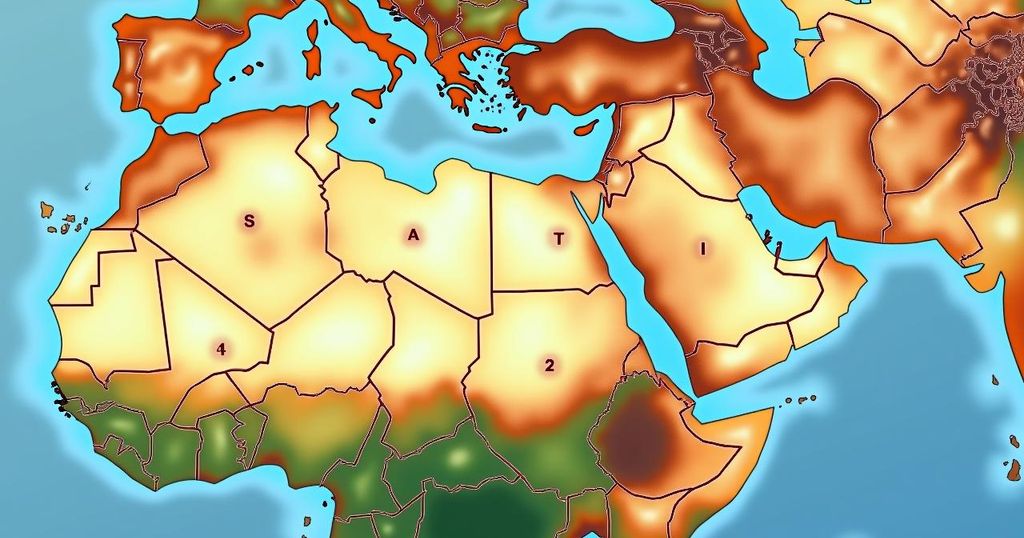Egypt, Eritrea, and Somalia Strengthen Security Ties Amid Regional Tensions

In a landmark summit, leaders of Egypt, Eritrea, and Somalia convened to enhance regional security coordination amidst rising tensions in the Horn of Africa, particularly driven by the war in Sudan and Ethiopia’s controversial maritime agreement with Somaliland. The meeting, which notably excluded Ethiopia, resulted in commitments to strengthen three-way ties and bolster Somalia’s national security against external and internal threats.
Egypt, Eritrea, and Somalia convened on Thursday to strengthen collaborative efforts regarding regional security amidst rising tensions in the Horn of Africa. This unprecedented summit, hosted in Asmara, was significantly influenced by the ongoing conflict in Sudan, a contentious maritime agreement between Ethiopia and the self-declared independent region of Somaliland, and increased instability in the Red Sea due to assaults by Yemen’s Houthi rebels. The summit highlighted the formation of a new strategic alliance within the Horn of Africa, with Ethiopia notably excluded from the discussions despite being a major regional player. Relations between Somalia and Ethiopia have sharply deteriorated, particularly following Ethiopia’s agreement with Somaliland that Somalia perceives as a breach of its sovereignty. This has resulted in Somalia aligning more closely with Egypt, a traditional adversary of Ethiopia. Eritrean President Isaias Afwerki, alongside Egypt’s President Abdel Fattah al-Sisi and Somalia’s President Hassan Sheikh Mohamud, engaged in talks that culminated in a joint statement which emphasized the importance of respecting sovereignty, independence, and territorial integrity within the region, specifically alluding to the need for halting foreign interference in domestic matters. During their discussions, the leaders recognized the necessity for strengthened cooperation to assist Somalia in tackling both internal challenges and external threats, particularly those posed by terrorism. They agreed on the need for a tripartite committee of foreign ministers to enhance strategic collaboration across various fields. In addition to these agreements, the current crises in Sudan and the escalating situation in the Red Sea were addressed. Notably, President Sisi’s visit was the first by an Egyptian leader to Eritrea since the 1990s, underscoring a pivotal moment in their bilateral relations. The gathering was also a response to Ethiopia’s recent agreements which have generated significant discontent in Somalia, complicating the geopolitical landscape. As regional alliances shift, with Somalia moving closer to Egypt, the implications for Ethiopia’s foreign relations and its internal stability are becoming more pronounced, especially concerning issues surrounding the Grand Ethiopian Renaissance Dam and its relations with Eritrea and the Tigray region.
The Horn of Africa remains a region of significant geopolitical interest, characterized by complex inter-state relationships, historical rivalries, and ongoing conflicts. Recent developments, such as the war in Sudan and tensions in the Red Sea, have exacerbated existing frictions. The memorandum between Ethiopia and Somaliland regarding a naval base has especially intensified tensions, leading Somalia to seek closer ties with Egypt and Eritrea as a counterbalance. The long-standing animosities between Eritrea and Ethiopia, alongside Ethiopia’s historical issues with Somalia, establish a backdrop of insecurity in the region. The recent summit aims to address these challenges by promoting stability and cooperation among the involved states.
The summit of Egypt, Eritrea, and Somalia marks a significant shift in the geopolitical landscape of the Horn of Africa. The leaders’ commitment to fostering stronger ties for regional stability while addressing mutual security challenges underscores a strategic pivot away from Ethiopia, which has faced mounting criticism and exclusion from this newfound alliance. As developments unfold, the impact on the regional equilibrium, particularly concerning ongoing tensions in Sudan and relations with Somaliland, will be critical to monitor. The emerging partnership signifies a collaborative response to shared threats and an effort to navigate the complexities of sovereignty and territorial integrity in this volatile region.
Original Source: www.modernghana.com






